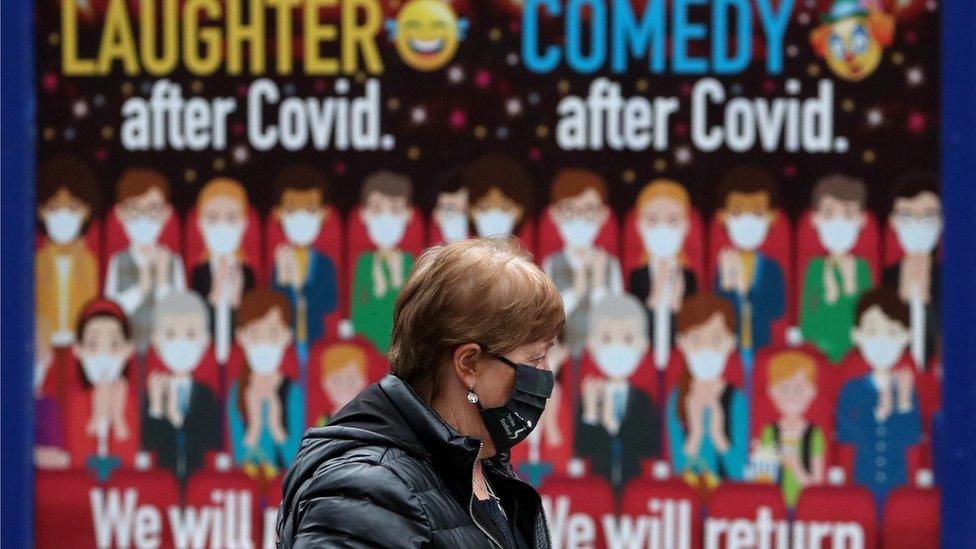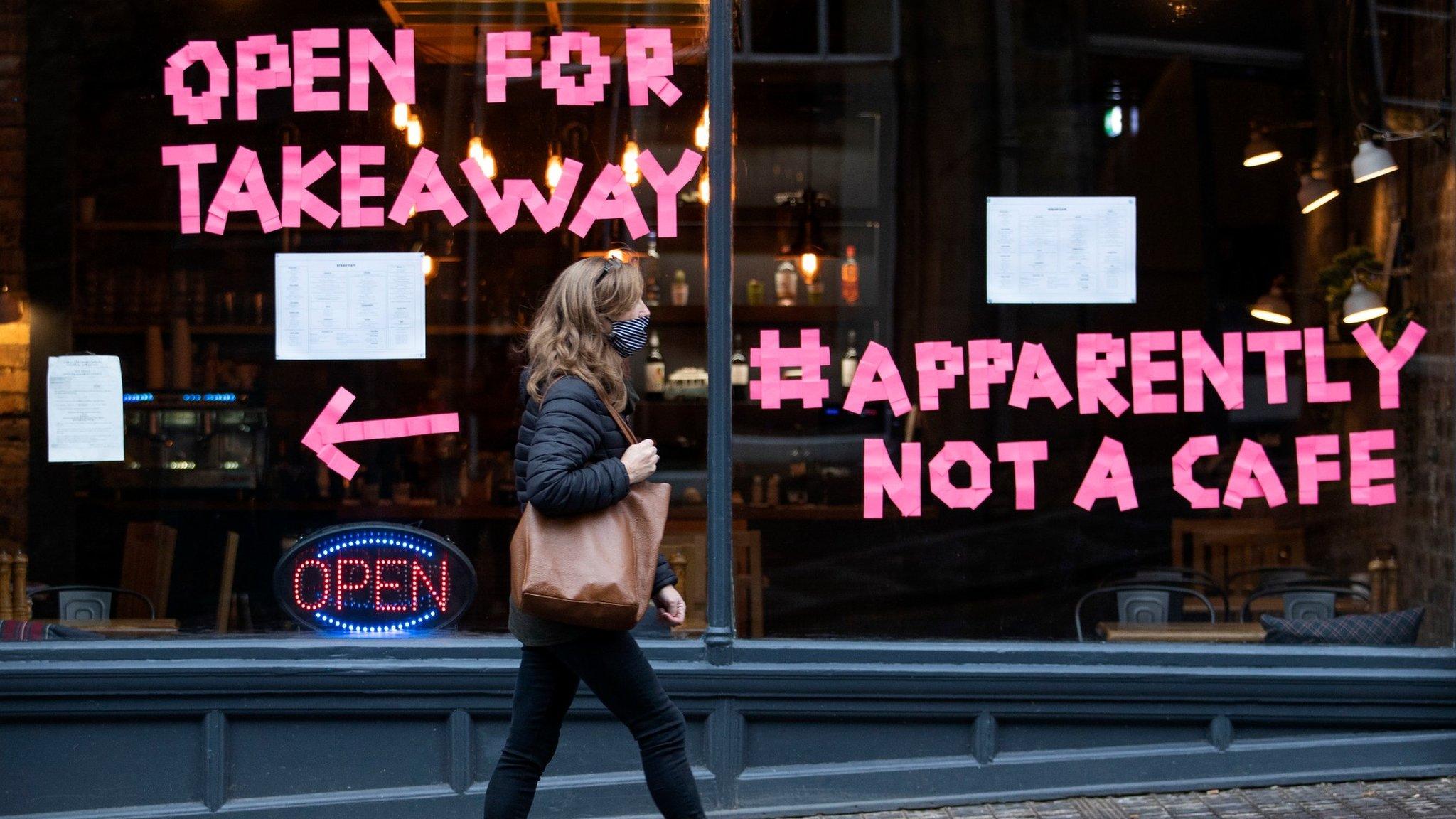Covid in Scotland: What are the differences between alert levels?
- Published

Half of Scotland's councils are to move down a level following the latest review of the country's Covid restrictions, external.
These include the 11 areas which had been in level four, which contains the toughest restrictions.
The changes take effect on Friday. So what are the rules which apply in the different levels?

About 2.3 million people in west and central Scotland have been living under these restrictions, which are the closest to a full lockdown, since 20 November.
All non-essential shops are closed, as are all pubs, cafes and restaurants - although they can still offer a takeaway service.
Hairdressers, tailors, barbers and beauticians also had to shut, along with all leisure, entertainment and visitor attractions, and public buildings.
Gyms and sports centres are also closed, with only non-contact sports allowed outdoors.
Socialising is not allowed in people's homes, although six people from two households can still meet outdoors.
It is illegal to travel outside your council area without a reasonable excuse, external and journeys within your area should also be kept to a minimum.
Up to 20 people can attend places of worship, weddings, civil partnerships, funerals and wakes. Wedding and civil partnership receptions are not allowed.

Shops, bars, restaurants, visitor attractions, libraries, hairdressers, barbers and beauticians can reopen if an area moves down to level three.
A maximum of six people from two households can meet in hospitality venues, either indoors or outdoors. However, no alcohol can be sold, and premises must close at 18:00.
All leisure and entertainment venues are closed, such as soft play, funfairs, snooker and pool halls, indoor bowling alleys, casinos and bingo halls. Outdoor live events are banned.
Gyms can open for individual exercise but indoor group exercise activities for over-18s are not allowed. Organised outdoor non-contact sports, personal training and coaching can take place, but contact sports are banned for adults (apart from professional sport).
Under-18s can take part in organised sports and activities, both indoor and outdoor, as long as they follow the guidance for that sport, external.
As in level four, it is against the law to travel outside your council area unless your journey is for an essential purpose.
Places of worship can open for up to 50 people, and there is a 20-person limit for weddings, civil partnerships, funerals, wakes and receptions.

In-home socialising is still not allowed, although up to six people from two households can meet outdoors and in hospitality settings.
Pubs, cafes and restaurants can serve alcohol indoors, but only with a main meal, and must close by 20:00. Outdoors, alcohol can be consumed without a meal and venues can stay open until 22:30.
Most leisure and entertainment premises are still closed. However, cinemas and bingo halls can reopen with physical distancing measures in place.
Stadium gatherings and events are still banned, other than drive-ins.
Adults are allowed to take part in organised outdoor sports, personal training and coaching, as well as indoor exercise classes and non-contact sports. Contact sports are not allowed indoors.
The rules for places of worship and for life events, such as weddings and funerals, are the same as in level three.
By law, those in levels two and below should not travel into level three or four areas unless their journey is essential. People should also not travel to or from other parts of the UK without a reasonable excuse.
People living in level two and below are also asked to minimise unnecessary journeys between areas in different levels.

There should be a "reasonable" degree of normality in level one.
In Orkney, Shetland and the Western Isles, up to six people from two households are allowed to meet indoors at home.
However, the ban on meeting in your or another person's home remains in the other level one areas.
Up to eight people from three households can meet outside - either in a park or garden, or outdoors at a hospitality venue.
Pubs cafes and restaurants can serve food and alcohol in line with normal licensing rules, but must close by 22:30.
Soft play, funfairs, snooker and pool halls, indoor bowling alleys, casinos and bingo halls can reopen, although nightclubs and adult entertainment venues are still closed. All indoor and outdoor visitor attractions can also open.
The guidelines on participating in sport are similar to those in level two, with adults still unable to take part in indoor contact sports.
It is possible for crowds to return to sports stadia with limited numbers, and outdoor seated events are also allowed.
Outdoor grouped standing events are still banned, although small indoor seated events can take place.
The rules for travel, life events and places of worship are the same as in level two.

This level is broadly comparable to the position in August when the virus was very suppressed in Scotland but still a threat.
A maximum of eight people from three households would be able to meet indoors, either in someone's home or in hospitality premises.
Up to 15 people from five households can gather outdoors, either in a park or garden or outdoors at a pub, cafe or restaurant.
All outdoor events are allowed, with restricted numbers. Indoor events can go ahead where those attending are seated or able to walk around a venue, but events where people stand in groups should not take place.
Leisure and entertainment remains open with the exception of nightclubs and adult entertainment venues.
Up to 50 people can attend weddings, civil partnerships, funerals, wakes and receptions. The same number can attend indoor places of worship, but 200 people could be allowed at an outdoor act of worship.
The same travel rules apply as in levels one and two.



- Published23 October 2020
